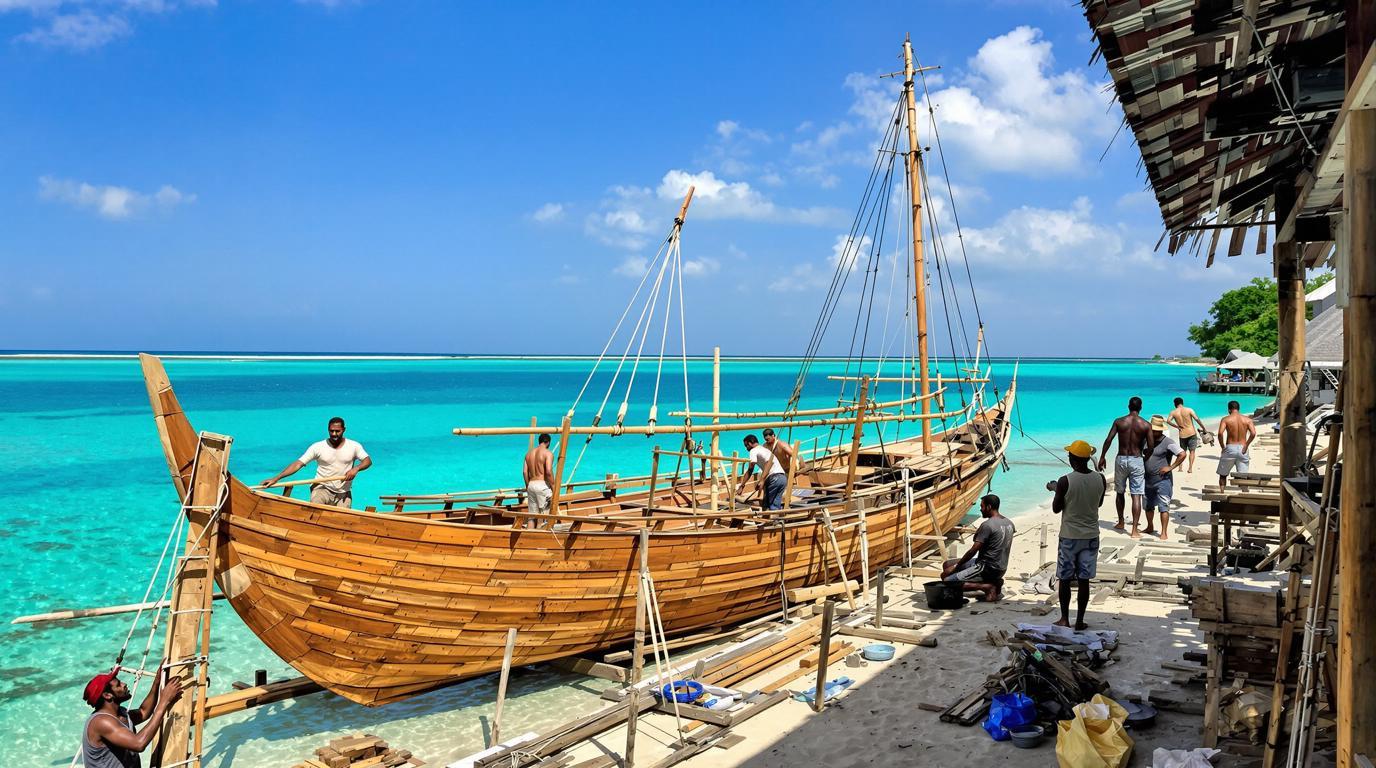The first time I set foot in Nungwi, I wasn’t prepared for how the water would shift between seven distinct shades of blue throughout the day. While most visitors flock to this northern tip of Zanzibar for its postcard-perfect beaches, the real magic of Nungwi reveals itself when you step away from the sunbathers and into the lives of those who’ve called this fishing village home for generations.
Where ancient traditions thrive beneath tourism’s gentle waves
Long before resort developers discovered Nungwi’s pristine shores, this village was renowned throughout East Africa for something entirely different: masterful dhow boat construction. These traditional wooden sailing vessels have been handcrafted here using the same techniques for over 500 years.
“My grandfather taught my father, who taught me,” explains Kassim, a third-generation boat builder whose weathered hands never stop moving as we talk. “Each dhow carries the stories of our ancestors in its wood. Tourists come and go with the seasons, but the boats remain our true legacy.”
Today, Nungwi balances precariously between its fishing village roots and its evolution into Zanzibar’s premier beach destination. This tension creates a rare opportunity for travelers willing to explore beyond the infinity pools.
Discovering the soul of Nungwi beyond the beach
The secret lighthouse path at dawn
Most visitors never discover the narrow footpath leading from Nungwi’s northern point to the abandoned lighthouse. Arriving before 6 a.m. rewards early risers with a symphony of colors as fishing dhows return with the night’s catch, silhouetted against the sunrise. The lighthouse keeper’s quarters remain unlocked, offering a haunting glimpse into colonial-era Zanzibar through faded logbooks and vintage navigation equipment.
The twilight turtle sanctuary experience
While the Mnarani Turtle Conservation Pond sees crowds during daytime hours, few know about the special access granted to visitors who arrive at dusk. For a modest donation (20,000 Tanzanian shillings), you can join the evening feeding ritual when massive 80-year-old hawksbill turtles emerge from deeper waters they avoid during busy daylight hours. The absence of crowds creates an intimate connection impossible during regular visiting times.
This experience has become especially meaningful as similar spots around the world have seen decline. For a comparable hidden paradise with turquoise waters, you’d need to venture to lesser-known Mexican isles where similar conservation efforts thrive.
Savoring flavors that tell Zanzibar’s spice-laden story
Skip the overpriced resort restaurants and head to Mama Chiku’s unmarked food stall, identifiable only by blue plastic chairs clustered near the fishermen’s beach. Her octopus curry simmers for six hours with fourteen distinct spices, creating a complexity that perfectly embodies Zanzibar’s position at the crossroads of African, Arabic, and Indian influences.
“The secret is the timing of each spice,” Mama Chiku confides. “Cardamom first, cinnamon last, and never rush the ginger.” At 12,000 shillings (about $5), this meal delivers more authentic flavor than anything on the resort menus costing five times as much.
For budget-conscious travelers, Nungwi offers exceptional value compared to similar destinations. It even makes lists of affordable exotic destinations where you can travel comfortably for under $25 daily if you embrace local eateries and guesthouses.
Navigating Nungwi like a seasoned island traveler
Timing your visit for cultural immersion
While December through February brings perfect weather, consider the shoulder season of June instead. You’ll find fewer crowds, lower prices, and the annual dhow racing competitions when local sailors showcase generations of seafaring prowess in hotly contested races.
Connecting with authentic island life
Those seeking deeper cultural connections should explore beyond Nungwi’s main strip. Just south in Kendwa, visit villages preserving traditional seaweed farming techniques, much like Indonesian islands that maintain century-old seaweed farming traditions. The women who tend these underwater gardens welcome respectful visitors and sometimes offer impromptu seaweed cooking demonstrations.
Reflections from the edge of paradise
As my final Nungwi sunset paints the Indian Ocean in impossible colors, I’m struck by how this place remains authentic despite decades of tourism. The dhow builders still shape vessels by hand, the fishermen still navigate by stars, and the turtles still return to nest on beaches they’ve known for centuries. The true luxury of Nungwi isn’t found in its resort amenities but in these enduring rhythms that connect visitors to something far older than vacation trends.
